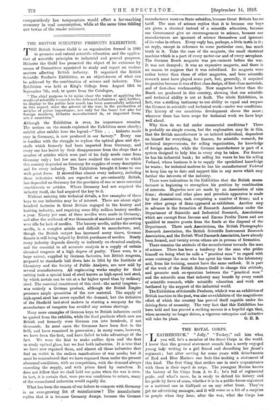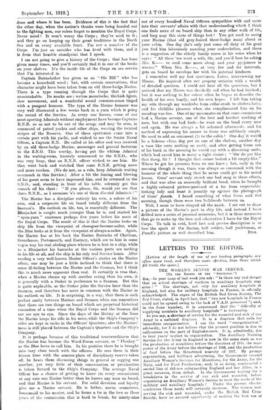THE ROYAL CORPS.
" EATHERNECK," " Jolly," " Turkey," call him what
4 you will, he's a member of the finest Corps in the world. I know that this general statement sounds like a newly engaged young lady writing to a girl friend and describing her fiance's regiment ; but after serving for some years with detachments of Red and Blue Marines one feels like making a statement of this kind. The first thing that strikes one in one's acquaintance with them is their esprit de corps. The youngest Marine knows the history of his Corps from A to Z ; he's full of regimental pride, and what's more, he is ready to defend his history and his pride by force of arms, whether it is in a public-house argument or a national one in Gallipoli or on any other front. They've got no advertising manager, and it will come as a bit of a surprise to people when they hear, after the war, what the Corps has
done and where it has been. Evidence of this is the fact that the other day, when the nation's thanks were being handed out to the fighting men, our rulers forgot to mention the Royal Corps. Never mind I It won't worry the Corps ; they're used to it ; and they go on keeping up their great traditions in the North Sea and on every available front. I'm not a member of the Corps. I'm just an outsider who has lived with them, and it is from that humble standpoint that I speak.
I am not going to give a history of the Corps ; that has been given many times, and you'll certainly find it in one of the books on your shelves. It's the inside life of the Corps on sea service that I'm interested in
Captain Bairnsfather has given us an " Ole Bill " who has become a household word ; but, with certain reservations, that character might have been taken from an old three-badge Marine. There is a type running through the Corps that is quite unmistakable. Its marks are : walrus moustache, thickish figure, slow movement, and a wonderful sound common-sense tinged with a pungent humour. The type of the Marine humour was very well illustrated a few weeks back in a yarn whioh is going the round of the Service. As every one knows, some of our most sporting Admirals without employment have become Captains R.N.R. so as not to be out of the scrap, and may be seen, in command of patrol yachts and other ships, wearing the twisted stripes of the Reserve. One of these sportsmen came into a certain port with his yacht, and wished to see the Senior Naval Officer, a Captain R.N. He called at his office and was received by an old three-badge Marine, messenger and general factotum to the S.N.O. This worthy, having put the whilom Admiral in the waiting-room, leisurely announced to the S.N.O., who was very busy, that an R.N.R. officer wished to see him. He then went back and watched that same R.N.R. getting more and more restless. (We do not, as a rule, keep Admirals waiting overmuch in this Service.) After a bit the fuming and blowing of his guest seem to have impressed him, and he returned to the S.N.O., and, standing in front of his table, solemnly got this remark off his chest " If you please, Sir, would yer see that there R.N.R., as I surmises 'e's one of them disrated Admirals ! "
The Marine has a discipline entirely his own, a salute of his own, and a corporate life on board totally different from the Seaman's. His outlook on life, too, is essentially different. The Bluejacket is caught.much younger than he is, and started his " spun-yarn " existence perhaps five years before his mate of the Royal Corps. The result of this is that the Marine looks on ship life from the viewpoint of shoregoer-become-sailor, while the Blue looks at it from the viewpoint of always-a-sailor. Again, the Marine has at his back the Marine Barracks of Chatham, Stonehouse, Portsmouth, and Eastney, which are to him in some vague way his real abiding-place whence he is lent to a ship, while to a Bluejacket his barracks at the various ports are nothing in his-life at all, and the ship is his only real Service home. After reading a very well-known Marine Officer's stories on the Marine afloat, one may be just a little inclined to think that there is sonic ill-feeling between the Marine and the Seaman, but I think this is much more apparent than real. It certainly is true that, when a Marine chums up with another rating than his -own, it is generally with a Stoker in preference to a Seaman. But this is quite explicable, as the Stoker joins the Service later than the Seaman, and therefore has more in common with the Marine in his outlook on life. It is surprising, in a way, that there is such perfect amity between Marines and Seamen when one remembers that there are two things on board which are perpetual historical reminders of a time when the Royal Corps and the Seaman did not see eye to eye. Since the days of the Mutiny at the Nore the Marine keeps his rifle in his mess, while the Ship's Company's rifles are kept in racks in the Officers' Quarters; also the Marines' mess is still placed between the Captain's Quarters and the Ship's Company.
It is perhaps because of this traditional trustworthiness that the Marine has become the Ward-Room servant, or " Flunkey " as the Blue loves to call him. In his position there he is brought into very close touch with the officers. He sees them in their leisure time with the armour-plate of disciplinary reserve taken off, he hears them discussing things in general or ragging one another, yet very little of their conversation or peculiarities is taken forrard to the Ship's Company. The average Naval Officer has a chance of getting to know (in every commission) at any rate one Marine better than he knows any man on board, and that Marine is his servant. For solid devotion and loyalty give me a Marine servant. He is father, nurse, seamstress, housemaid to his master, and he forms a tie in the two or three years of the commission that is hard to break, for ninety-nine
out of every hundred Naval Officers sympathize with and enter into their servants' affairs with that understanding whioh I think one finds more of on board ship than in any other walk of life, and long may this state of things last ! You get used to seeing your Marine (that old grey-haired three-badge man) about in your cabin. One day (he's only just come off duty at his gun) you find him laboriously mending your underclothes, and there is a suggestion of the elderly family nurse in his voice when he says : " All these 'ere want a refit, Sir, and you'd best be asking Mrs. K— to send some more along, and your py-jamers is wusser." When Mrs. K—, at very few and far intervals, gets on board he envelops her with his paternal kindness.
I remember well my last sportsman, Lakes, interviewing my Missus. He inquired after our progeny seriatim with a wealth of detailed question. I could not hear all the questions, but I noticed that my Missus was decidedly red when he bad finished ; but it was nothing to her colour when be began to describe the health of his own family, and his own hopes. I left him taking my wife through my wardrobe from collar-studs to cholera-belts, and his childlike pleasure when she complimented him on his mending was fine. One of my messmates on that same commission had a Marine servant, one of the best and hardest working of men, but with one bad fault—he went on the bend every now and again. He was always a bit ashamed afterwards, and his method of expressing his sorrow to Guns was sublimely simple. He used to add an ornament (1) to the cabin ! One day it would be a hideous china dog put on one of the shelves, another day a vase like unto nothing on earth, and after getting Guns out of his bunk in the morning. he would say with a disarming smile, which had saved him in many a tight corner : "'Ow do yer like that dawg, Sir '1 I thought that corner looked a bit empty-like." Where he got his presents from no one knew ; but, early in the morning though it was, Guns was always so consumed with the humour of the whole thing that he never could get in his moral lesson. Guns' servant only struck one bad snag in these efforts, and that was after an unusually brilliant bend, when he brought a highly coloured picture-postcard of a far from respectable- looking lady and leant it jauntily up against the photograph of Guns' fiancee. I heard something of what Guns said that morning, though there were two bulkheads between us.
Well, I seem to have strayed off the mark. I set out to draw a picture of the Marine's part in ship life, and instead. I have drifted into a series of personal memories, but it is those memories that go to make up the love and admiration I have for the Royal Corps. To talk in cold, hard fact and precise description is to lose the spirit of the Marine, half soldier, half yachtsman, as
Punch's picture so well described him. Buss.



























 Previous page
Previous page